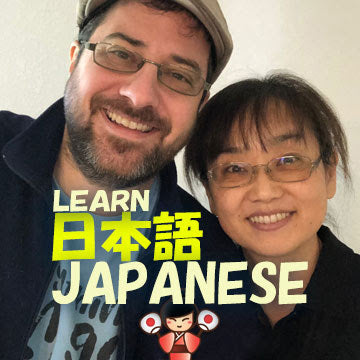Improve your Japanese: Motivation
Tips for keeping your motivation for learning Japanese up!

In the mid-90s when I was a bright-eyed and bushytailed new student of Japanese, I was beyond excited. There were times when it seemed like my Japanese was improving by leaps and bounds. Do you know how to say “sushi” in Japanese? Well, I do!
But once I entered the upper beginner stage, I often only saw plateaus; it was just plain hard to open that textbook some days.
I'm doomed...
Usually when I found myself disinclined to meet a new kanji, I went shopping for the newest shiny object: a book on Japanese. While this was fine and did result in me getting excited about learning again, I found the motivation was temporary and most of the books and resources were not used to the fullest extent. I made decent progress, but I didn’t have a system in place to organize my learning and keep my motivation constant.

If you suffer from on-and-off studying habits, you need a system too. Don’t be like Mark Twain who found quitting smoking the easiest thing in the world to do since he had done it thousands of times. If right now you find yourself lapsing in your Japanese language journey, start today with a plan, follow through with it for a month to create a habit, and be amazed at how motivation sticks around when you have a working plan.
So, here are a few ideas to create that plan and stay motivated to do it.
Create boundaries of time and space.
 Time: Set aside a fixed amount every day for studying Japanese. For example, 6:45AM to 7:00 is your Japanese time; nothing happens then but studying Japanese!
Time: Set aside a fixed amount every day for studying Japanese. For example, 6:45AM to 7:00 is your Japanese time; nothing happens then but studying Japanese!
Space: To encourage a habit, make one area of your house your study area. For example, set up a small desk and a chair in an unused corner of your den. This is sacred space and only for learning Japanese.
Set long and short term goals
Imagine yourself five years from now. Are you able to speak Japanese fluently? Yes, that’s you ordering for all your friends at the local Japanese restaurant. That’s you picking up a Yomiuri newspaper and yelling at the advice column. See yourself accomplishing your dreams. Visualize yourself. Now think about what your goals are for the next year. What do you need to accomplish in a year to be on track for your five-year goal? How about for the next three months? Next month? Next week? Today? It may seem like a silly waste of time, but write these goals down. It really does make a difference.
Be very specific! For example, to accomplish my dream of speaking Japanese fluently, I will go through a chapter of my textbook a week. Every day, I will spend 10 minutes reading books just above my level. I will also write a dozen kanji 20 times each while imagining mnemonics and reviewing this week’s vocabulary list on Anki.
Minimize distractions  Every time the phone rings, your spouse calls you, or your email program chimes, your focus is spirited away. It may seem minor, but when you’re in the zone, it can be devastating. Get rid of the distractions and get concentrating.
Every time the phone rings, your spouse calls you, or your email program chimes, your focus is spirited away. It may seem minor, but when you’re in the zone, it can be devastating. Get rid of the distractions and get concentrating.
Wake up 30 minutes earlier I’ve always been a zombie after 9 PM. But I used to love staying up to midnight watching mindless videos or reading lightweight novels. For the past few months have been going to bed earlier and getting up before five. That time before everyone else wakes up is magical. I get things done before the world has its first cup of coffee. Maybe 5 AM is too extreme for you, but what if you got up 30 minutes earlier than you normally do? Think of what you can get done if you got up only 15 minutes earlier. Perhaps you can spend a few minutes exercising, make the coffee, go for a jog, or… spend some time learning Japanese.
I’ve always been a zombie after 9 PM. But I used to love staying up to midnight watching mindless videos or reading lightweight novels. For the past few months have been going to bed earlier and getting up before five. That time before everyone else wakes up is magical. I get things done before the world has its first cup of coffee. Maybe 5 AM is too extreme for you, but what if you got up 30 minutes earlier than you normally do? Think of what you can get done if you got up only 15 minutes earlier. Perhaps you can spend a few minutes exercising, make the coffee, go for a jog, or… spend some time learning Japanese.
 Life is a role playing game after all! It seems our mind wakes up refreshed with a full bar of creative energy. Imagine the bar above your virtual head in the game. As we go through the day, that bar goes down. Caffeine or a power nap might give you a level boost, but most people are naturally most alert in the morning. Use that time to get you that much closer to your ultimate goal of being fluent in Japanese. Do this for a month and it becomes a habit. Positive habits can be hard to start but if you can do it for month, it becomes much easier to maintain.
Life is a role playing game after all! It seems our mind wakes up refreshed with a full bar of creative energy. Imagine the bar above your virtual head in the game. As we go through the day, that bar goes down. Caffeine or a power nap might give you a level boost, but most people are naturally most alert in the morning. Use that time to get you that much closer to your ultimate goal of being fluent in Japanese. Do this for a month and it becomes a habit. Positive habits can be hard to start but if you can do it for month, it becomes much easier to maintain.
Find Language Partners

Back in the 1990s, the University I went to had a language partner program. This program matched English speakers with foreign students so both could practice the other’s language. I had a few partners and it was a great experience. For 30 minutes we would speak in Japanese and 30 minutes we would speak in English.
Nowadays, there are so many more opportunities online for finding language partners. Join Facebook groups with people at your level. Find a Japanese penpal and Skype regularly. See if there are any friends of yours who are interested in learning Japanese. Start a meet up group locally for those wanting to learn Japanese.
Not only will this keep motivation up but sharing your progress and your dreams with friends can help with accountability.
Be intrigued by your mistakes
Ever wonder how children who move to another country can pick up the language so easily? I have a friend from Colombia and after one year in the States, his seven-year-old daughter has flawless English pronunciation. I think one of the main reasons is young children are not afraid to make mistakes. It’s just part of life.
 We’ve been trained to think of mistakes as indicative of our self-worth. Ever tell yourself you are stupid when you forget a name? That’s what I’m talking about and it is just about the worst thing you can do to yourself. Yes, the phrase “learn from your mistakes” is a common mantra, but no one likes to make mistakes. The good news is you don’t have to like them, but there is a way to learn from your mistakes.
We’ve been trained to think of mistakes as indicative of our self-worth. Ever tell yourself you are stupid when you forget a name? That’s what I’m talking about and it is just about the worst thing you can do to yourself. Yes, the phrase “learn from your mistakes” is a common mantra, but no one likes to make mistakes. The good news is you don’t have to like them, but there is a way to learn from your mistakes.
Use curiosity.
Look at the results of your mistake as an intriguing object; something to be learned from. Dr. Carol Dweck has a wonderful book Called Mindset. In it she has this quote about raising children (it’s also good for us adults learning languages):
“If parents want to give their children a gift, the best thing they can do is to teach their children to love challenges, be intrigued by mistakes, enjoy effort, and keep on learning.”
Lastly, check progress and note results
Being a writer, it is easy to check progress by looking at the word count. Being an athlete, it is also easy to gauge how well your improving by looking at your times. But how do you check progress as a language learner? It’s not as easy, but there are ways.
When I lived in Japan, I worked in the JET programme as an English teacher. I was mainly at a junior high school, but once a week I went to an elementary school. Each year I had about 10 schools that rotated each week. The nice thing about this was every time I went to the same school—usually three months later—I talked to the same people. I talked to the same principal and, remembering how I stumbled the last time, I could realize I was able to say so much more than the last time I was there. I clearly saw my progress and rejoiced in my results.
You probably won’t have a similar situation, but you can do things to look back and gauge your progress. For example, get in the habit of recording yourself reading cold reads once a week. That is, record yourself reading a news article online or a scene from a manga that you like. Then review recordings that you made the month before and two months before that. I bet you’ll see an improvement. And that’s huge for motivation.

Anyway you do it, first and foremost create a regular study schedule for your Japanese language learning. Studying 10 minutes a day is much better than binging an hour on the weekend. Then, find ways to motivate yourself. You can do it. Anyone who has a goal and truly wants to accomplish that goal can do it. Do you have a plan?
-Clay





